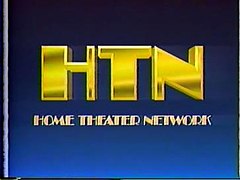
Showtime is an American premium television network and the flagship property Showtime Networks, a sub-division of the Paramount Media Networks division of Paramount Global. Showtime's programming includes theatrically released motion pictures, original television series, boxing and mixed martial arts matches, occasional stand-up comedy specials, and made-for-TV movies.

Cinemax is an American pay television, cable, and satellite television network owned by the Home Box Office, Inc. subsidiary of Warner Bros. Discovery. Developed as a companion "maxi-pay" service complementing the offerings shown on parent network Home Box Office (HBO) and initially focusing on recent and classic films upon its launch on August 1, 1980, programming featured on Cinemax currently consists primarily of recent and older theatrically released motion pictures, and original action series, as well as documentaries and special behind-the-scenes featurettes.

Flix is an American premium cable and satellite television network owned by Showtime Networks, a subsidiary of Paramount Global operated through its Paramount Media Networks division. Its programming consists solely of theatrically released motion pictures released from the 1970s to the present day, interspersed with some films from the 1950s and 1960s.

The Movie Channel (TMC) is an American premium television network owned by Showtime Networks, a subsidiary of Paramount Global operated through its Paramount Media Networks division. The network's programming mainly features first-run theatrically released and independently produced motion pictures, and during promotional breaks between films, special behind-the-scenes features and movie trivia.
Pay television, also known as subscription television, premium television or, when referring to an individual service, a premium channel, refers to subscription-based television services, usually provided by multichannel television providers, but also increasingly via digital terrestrial and streaming television. In the United States, subscription television began in the late 1970s and early 1980s in the form of encrypted analog over-the-air broadcast television which could be decrypted with special equipment. The concept rapidly expanded through the multi-channel transition and into the post-network era. Other parts of the world beyond the United States, such as France and Latin America have also offered encrypted analog terrestrial signals available for subscription.
Starz is an American premium cable and satellite television network owned by Lionsgate, and is the flagship property of parent subsidiary Starz Inc. Programming on Starz consists of theatrically released motion pictures and first-run original television series. Launched in 1994 as a multiplex service of Starz Encore, Starz operates six 24-hour, linear multiplex channels; a traditional subscription video on demand service; and a namesake over-the-top streaming platform that both acts as a TV Everywhere offering for Starz's linear television subscribers and is sold directly to streaming-only consumers.
Crave is a Canadian premium television network and streaming service owned by the Bell Media subsidiary of BCE Inc.

Movie Central was a Canadian English language Category A premium cable and satellite television channel that was owned by Corus Entertainment. Movie Central was designated to operate west of the Ontario-Manitoba border, including the territories. Although the channel's name implies that it focuses solely on theatrically released motion pictures, Movie Central's programming included original and foreign television series, made-for-cable movies and documentaries.
Starz Encore is an American premium television channel owned by Starz Inc. a subsidiary of Lions Gate Entertainment and headquartered at the Meridian International Business Center complex in Meridian, Colorado, United States. Launched as Encore on 1 April 1991, its programming features mainly older and recent theatrically released feature films, although some of its multiplex channels also carry acquired television series. It is the sister channel of Starz and MoviePlex.

Showtime Networks Inc. is an American entertainment company that oversees the company's premium cable television channels, including its flagship service Showtime. It is a subsidiary of media conglomerate Paramount Global under its networks division.

Home Box Office (HBO) is an American pay television network, which is the flagship property of namesake parent-subsidiary Home Box Office, Inc., itself a unit owned by Warner Bros. Discovery. The overall Home Box Office business unit is based at Warner Bros. Discovery's corporate headquarters inside 30 Hudson Yards in Manhattan's West Side district. Programming featured on the network consists primarily of theatrically released motion pictures and original television programs as well as made-for-cable movies, documentaries, occasional comedy, and concert specials, and periodic interstitial programs.

Spotlight was an American premium cable television network that was founded by the Times Mirror Satellite Programming Company unit of the Times Mirror Company, and owned as a joint venture with Storer Communications, Cox Cable and Tele-Communications Inc. (TCI). The channel's programming focused mainly on theatrically released motion pictures, with the only scheduling deviation being of monthly specials previewing films set to air on the channel.
A free preview is a stunt programming concept in which a pay television service or channel tier is exhibited without signal encryption to customers of a multichannel television provider at no cost for an extended time period.

Home Box Office, Inc. (HBO) is an American multinational media and entertainment company operating as a unit of Warner Bros. Discovery.

MGM+, formerly known as Epix, is an American premium cable and satellite television network owned by the MGMPlus Entertainment subsidiary of Metro-Goldwyn-Mayer (MGM), which is itself a subsidiary of Amazon MGM Studios. The channel's programming consists of recent and older theatrically released motion pictures, original television series, documentaries, and music and comedy specials.
The United States pay television content advisory system is a television content rating system developed cooperatively by the American pay television industry; it first went into effect on March 1, 1994, on cable-originated premium channels owned by the system's principal developers, Home Box Office, Inc. and Showtime Networks. The voluntary-participation system—developed to address public concerns about explicit sexual content, graphic violence and strong profanity that tend to be featured in pay-cable and pay-per-view programming—provides guidance to subscribers on the suitability of a program for certain audiences based on its content.
Ancillary markets are non-theatrical markets for feature films, like home video, television, Pay Per View, VOD, Internet streaming, airlines and others.

Disney Channel is an American pay television channel that serves as the flagship property of Disney Branded Television, a unit of the Disney General Entertainment Content division of The Walt Disney Company.

Festival is a defunct American premium cable television network that was owned by Home Box Office, Inc., then a subsidiary of Time Inc., and operated from 1986 to 1988. The channel's programming consisted of uncut and re-edited versions of recent older theatrically released motion pictures, along original music, comedy and nature specials sourced from the parent HBO channel aimed at a family audience.

HBO is an American premium television network that is the flagship property of Home Box Office, Inc., a subsidiary of Warner Bros. Discovery. The network primarily broadcasts theatrically released motion pictures and original television programs as well as made-for-cable movies, documentaries, occasional stand-up comedy and concert specials, and periodic interstitial programs. HBO does not accept traditional advertising, although programming promotions are typically aired between shows; it also presents content without editing for profanity, violence, sexual depictions, nudity, drug use or other subjectively objectionable material, which—besides being able to depict mature subject matter usually not allowed to air on advertiser-supported television networks—has allowed the network to give program creators full creative autonomy over their projects.











